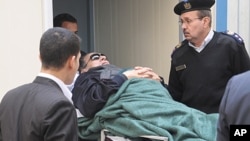Egyptian prosecutors are presenting their case against ousted president Hosni Mubarak, accusing him of tyranny during his near 30 year rule. A few Egyptians are seeing a parallel in the behavior of the nation's current rulers, especially in the suppression of dissent, as the anniversary of the uprising that ousted Mr. Mubarak nears.
The lead prosecutor on Tuesday called Mr. Mubarak a "tyrannical leader" who sought to hand power to his younger son, Gamal, spread corruption in the country and opened the door to his friends and relatives, ruining the country without any accountability.
Mustafa Suleiman's blistering attack on the 83-year-old former president was followed by harsh words for co-defendant Habib el-Adli. The lawyer argued the former interior minister kept the government in power by practicing "oppression and violence against Egyptians" in particular during last year's anti-government demonstrations in which more than 800 people were killed. Both men have denied the charges against them.
The demonstrators ultimately pushed both Mubarak and Adli from power, but the protests never really stopped. The main difference now is that anger is focused on the interim military rulers, who have overseen crackdown after deadly crackdown on demonstrators in Cairo's Tahrir square.
But Egyptian newspaper editor and political analyst Rania el Malki says the Supreme Council of the Armed Forces, or SCAF, has been careful to obscure any comparison between the Mubarak government's actions and its own.
"I think that the SCAF is continuing the tyranny, but I don't think that anyone watching the proceedings or reading about the proceedings will make the link between the two," said el Malki. "I think over the past month SCAF has managed to control the media in such a way as to make people believe that whatever is happening these days - and the tyranny of SCAF - is actually justified to protect Egypt from foreign conspiracy."
The accusation of foreign influence in Egyptian affairs has found a receptive audience in some quarters, with raids of human rights groups justified as an attempt to root out such "interference."
And many Egyptians appear less concerned with the ongoing protests, and the crackdowns, than with moving forward with parliamentary elections, now in the third and final phase for the lower house.
But the comparisons could take on a new life in coming weeks. Newly elected lawmakers are set to convene later this month and some foresee a showdown between them and the SCAF over what powers parliament will get and how quickly.
Just two days after that, on January 25, protesters are expected to mark the first anniversary of the uprising against Mubarak. And there is also the prospect of the leader of the SCAF, Field Marshal Mohamed Hussein Tantawi, returning to testify in Mubarak's trial.
Editor el Malki says she's doubtful the judge will yield to prosecutors' calls for Tantawi to face cross examination, and even if he does, he's likely to stick to his original statement on the previous government's crackdown on opponents.
"I don't think he would say anything different. I think he would say exactly what he said, which is that Mubarak never gave an order to shoot protesters," she said.
Which is exactly what Tantawi is saying about his current government, despite the dozens of deaths in recent weeks.
| Join the conversation on our social journalism site - Middle East Voices. Follow our Middle East reports on Twitter and discuss them on our Facebook page. |














